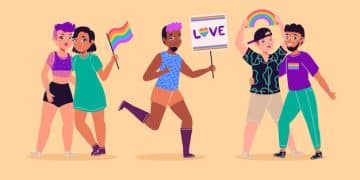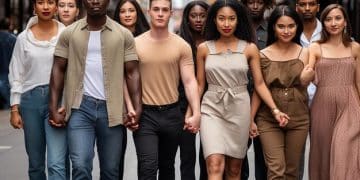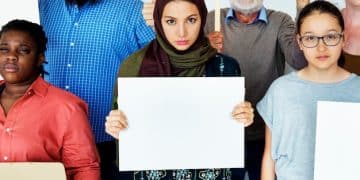LGBTQ+ Rights in the US: Current Challenges & Legislative Solutions
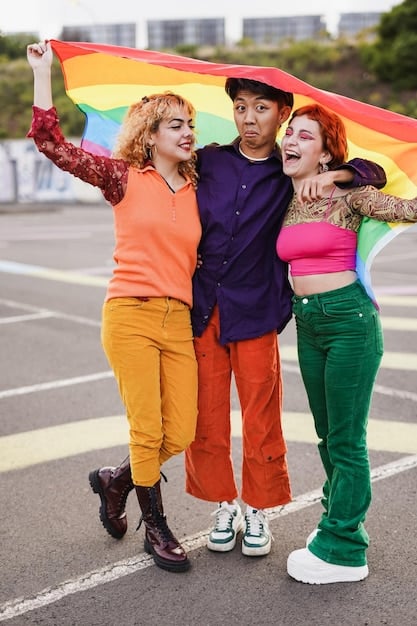
The current challenges facing LGBTQ+ rights in the US include discriminatory legislation, lack of comprehensive federal protections, and persistent social stigma, which legislative actions like the Equality Act aim to address by providing explicit and consistent protections against discrimination based on sexual orientation and gender identity.
The landscape of LGBTQ+ rights in the United States is constantly evolving. While significant progress has been made in recent decades, what are the current challenges facing LGBTQ+ rights in the US, and what legislative actions can address them? Understanding these challenges is crucial for advocating for a more just and equitable society.
Current Legal and Political Challenges
The LGBTQ+ community in the US faces numerous legal and political challenges that threaten their fundamental rights. These challenges manifest in various forms, from discriminatory legislation at the state level to the absence of comprehensive federal protections.
Discriminatory Legislation at the State Level
One of the most significant challenges is the rise of discriminatory legislation targeting LGBTQ+ individuals at the state level. These laws, often framed under the guise of religious freedom or parental rights, can have a devastating impact on the LGBTQ+ community.
These laws may include restrictions on transgender students’ participation in sports, limitations on gender-affirming care for transgender youth, and measures allowing businesses to refuse services to LGBTQ+ individuals based on religious beliefs. Such legislation creates a hostile environment and perpetuates discrimination.
Lack of Comprehensive Federal Protections
While the Supreme Court’s decision in *Bostock v. Clayton County* extended federal employment protections to LGBTQ+ individuals, comprehensive federal protections are still lacking. This absence leaves LGBTQ+ individuals vulnerable to discrimination in areas such as housing, public accommodations, and other essential services.
The lack of uniform federal protections means that LGBTQ+ individuals’ rights can vary significantly depending on where they live. This patchwork of protections creates uncertainty and inequality, making it difficult for LGBTQ+ individuals to navigate their lives with the same security and dignity as their non-LGBTQ+ counterparts.
- Religious Exemption Laws: These laws allow individuals and organizations to discriminate against LGBTQ+ individuals based on religious beliefs.
- Bathroom Bills: These laws restrict transgender individuals’ access to public restrooms that align with their gender identity.
- Healthcare Discrimination: Some healthcare providers refuse to provide services to LGBTQ+ individuals based on religious or moral objections.
Addressing these legal and political challenges requires a multifaceted approach. Advocates must work to defeat discriminatory legislation at the state level while simultaneously pushing for comprehensive federal protections that ensure LGBTQ+ individuals are treated with dignity and respect in all areas of life.
Social and Cultural Obstacles
Beyond legal battles, the LGBTQ+ community also encounters significant social and cultural obstacles that affect their well-being and acceptance in society. These obstacles range from persistent stigma and discrimination to mental health disparities and lack of inclusive representation.
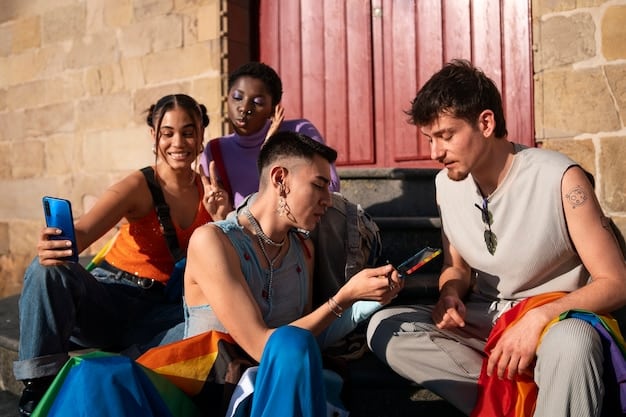
Persistent Stigma and Discrimination
Despite increasing acceptance, LGBTQ+ individuals continue to face stigma and discrimination in various aspects of their lives. This can manifest in the form of prejudice, harassment, and exclusion from social and professional opportunities.
Stigma and discrimination can have a profound impact on LGBTQ+ individuals’ mental and emotional health. It can lead to feelings of isolation, shame, and fear, making it difficult for LGBTQ+ individuals to live openly and authentically.
Mental Health Disparities
LGBTQ+ individuals experience higher rates of mental health conditions, such as depression, anxiety, and substance abuse, compared to their non-LGBTQ+ counterparts. These disparities are often linked to the stress and trauma associated with experiencing discrimination and stigma.
Access to mental health care can be a significant barrier for LGBTQ+ individuals, particularly in rural areas or communities where LGBTQ+ individuals are not accepted. Additionally, some mental health providers may lack the training and cultural competence necessary to effectively serve LGBTQ+ clients.
- Bullying and Harassment: LGBTQ+ youth are more likely to experience bullying and harassment in schools and online.
- Family Rejection: Rejection from family members can lead to homelessness and mental health issues for LGBTQ+ youth.
- Lack of Inclusive Representation: The underrepresentation of LGBTQ+ individuals in media and popular culture perpetuates stereotypes and reinforces negative perceptions.
Overcoming these social and cultural obstacles requires a concerted effort to promote understanding, acceptance, and inclusion. This includes challenging stereotypes, amplifying LGBTQ+ voices, and creating safe and supportive environments where LGBTQ+ individuals can thrive.
The Equality Act: A Potential Solution
The Equality Act is a landmark piece of legislation that aims to provide comprehensive federal protections against discrimination based on sexual orientation and gender identity. If enacted, the Equality Act would amend existing civil rights laws to explicitly include LGBTQ+ individuals.

What the Equality Act Would Do
The Equality Act would prohibit discrimination based on sexual orientation and gender identity in employment, housing, public accommodations, education, federally funded programs, credit, and jury service. This would create consistent and uniform protections for LGBTQ+ individuals across the country.
By amending existing civil rights laws, the Equality Act would provide a clear and comprehensive legal framework for addressing LGBTQ+ discrimination. This would make it easier for LGBTQ+ individuals to seek redress when they experience discrimination and would send a strong message that discrimination is unacceptable.
Potential Impact of the Equality Act
The Equality Act has the potential to significantly improve the lives of LGBTQ+ individuals in the US. By providing comprehensive federal protections, the Equality Act would help to create a more just and equitable society where LGBTQ+ individuals can live with dignity and respect.
In addition to providing legal protections, the Equality Act would also help to promote greater understanding and acceptance of LGBTQ+ individuals. By affirming the rights of LGBTQ+ individuals, the Equality Act would send a powerful message that LGBTQ+ individuals are valued members of society.
- Ending Discrimination in Employment: The Equality Act would prohibit employers from discriminating against LGBTQ+ individuals in hiring, firing, and promotion decisions.
- Ensuring Equal Access to Housing: The Equality Act would prohibit landlords from discriminating against LGBTQ+ individuals in renting or selling homes.
- Protecting LGBTQ+ Students: The Equality Act would protect LGBTQ+ students from discrimination in schools and educational programs.
While the Equality Act faces political obstacles, it remains a critical piece of legislation for advancing LGBTQ+ rights in the US. Advocates must continue to work to build support for the Equality Act and push for its enactment.
Challenges to Enacting the Equality Act
Despite its potential benefits, the Equality Act faces significant challenges in its path to becoming law. These challenges include political opposition, concerns about religious freedom, and the need for bipartisan support.
Political Opposition
The Equality Act faces strong opposition from conservative politicians and advocacy groups who argue that it infringes on religious freedom and could have unintended consequences. This political opposition makes it difficult to build the bipartisan support needed to pass the Equality Act.
Opponents of the Equality Act often raise concerns about the potential impact on religious organizations and individuals who hold traditional views on marriage and gender. They argue that the Equality Act could force religious organizations to violate their beliefs and could lead to lawsuits and other legal challenges.
Concerns About Religious Freedom
One of the primary concerns raised by opponents of the Equality Act is that it could infringe on religious freedom. Some argue that the Equality Act could force religious organizations to recognize same-sex marriage or to provide services to LGBTQ+ individuals that violate their beliefs.
Proponents of the Equality Act argue that it strikes a balance between protecting LGBTQ+ rights and respecting religious freedom. They point out that the Equality Act includes exemptions for religious organizations in certain circumstances and that it does not require religious organizations to violate their core beliefs.
Building Bipartisan Support
To pass the Equality Act, it is essential to build bipartisan support. This requires reaching out to Republicans and finding common ground on issues such as religious freedom and the scope of protections for LGBTQ+ individuals.
Building bipartisan support for the Equality Act also requires educating lawmakers and the public about the importance of protecting LGBTQ+ rights. This includes sharing stories of LGBTQ+ individuals who have experienced discrimination and highlighting the economic and social benefits of equality.
- Addressing Misconceptions: It is important to address misconceptions about the Equality Act and to clarify its provisions.
- Finding Common Ground: Identifying areas of agreement and compromise can help to build bipartisan support.
- Highlighting the Benefits of Equality: Emphasizing the economic and social benefits of equality can help to persuade lawmakers to support the Equality Act.
Overcoming these challenges requires a strategic and sustained effort to educate, advocate, and build consensus. By working together, advocates can help to create a more just and equitable society for LGBTQ+ individuals in the US.
The Role of Activism and Advocacy
Activism and advocacy play a crucial role in advancing LGBTQ+ rights in the US. From grassroots organizing to lobbying efforts, activists and advocates are working tirelessly to create a more inclusive and equitable society.
Grassroots Organizing
Grassroots organizing is essential for building support for LGBTQ+ rights at the local level. This includes organizing protests, rallies, and community events to raise awareness and mobilize support.
Grassroots organizing also involves building relationships with elected officials and advocating for policies that support LGBTQ+ rights. This can include meeting with lawmakers, testifying at hearings, and organizing letter-writing campaigns.
Lobbying Efforts
Lobbying efforts are also critical for advancing LGBTQ+ rights at the state and federal levels. Lobbyists work to educate lawmakers about the issues facing the LGBTQ+ community and to advocate for legislation that protects their rights.
Lobbying efforts can involve working with coalition partners to amplify the voices of LGBTQ+ individuals and to build support for specific legislative proposals. This can include meeting with lawmakers, drafting legislation, and organizing grassroots lobbying campaigns.
The Importance of Visibility
Visibility is essential for challenging stereotypes and promoting understanding of LGBTQ+ individuals. By sharing their stories and experiences, LGBTQ+ individuals can help to break down barriers and create a more inclusive society.
Visibility can also inspire other LGBTQ+ individuals to come out and live openly. By seeing others who are living authentically, LGBTQ+ individuals can feel more empowered to embrace their identities and advocate for their rights.
- Supporting LGBTQ+ Organizations: Donating to and volunteering with LGBTQ+ organizations can help to advance their mission.
- Educating Others: Sharing information about LGBTQ+ issues with friends, family, and colleagues can help to increase understanding and acceptance.
- Advocating for Change: Contacting elected officials and advocating for policies that support LGBTQ+ rights can make a difference.
Activism and advocacy are essential for creating a more just and equitable society for LGBTQ+ individuals in the US. By working together, activists and advocates can help to advance LGBTQ+ rights and create a world where all individuals are treated with dignity and respect.
Looking Ahead: Future Challenges and Opportunities
The fight for LGBTQ+ rights in the US is far from over. As society continues to evolve, new challenges and opportunities will emerge. To ensure continued progress, it is essential to remain vigilant and proactive.
Addressing Emerging Challenges
One of the emerging challenges facing the LGBTQ+ community is the rise of anti-transgender legislation. These laws, which seek to restrict transgender individuals’ access to healthcare, public accommodations, and other essential services, pose a significant threat to transgender rights.
Another emerging challenge is the increasing polarization of American politics. This polarization makes it difficult to build consensus on LGBTQ+ issues and can lead to gridlock and inaction.
Seizing Opportunities
Despite these challenges, there are also significant opportunities to advance LGBTQ+ rights in the coming years. One opportunity is to build on the momentum of the Supreme Court’s decision in *Bostock v. Clayton County* and to push for comprehensive federal protections for LGBTQ+ individuals.
Another opportunity is to increase LGBTQ+ representation in elected office. By electing more LGBTQ+ individuals to positions of power, the LGBTQ+ community can ensure that their voices are heard and that their concerns are addressed.
- Supporting LGBTQ+ Candidates: Electing LGBTQ+ individuals to office can help to advance LGBTQ+ rights.
- Building Coalitions: Working with allies can help to amplify the voices of LGBTQ+ individuals.
- Staying Informed: Staying informed about the issues facing the LGBTQ+ community can help individuals to advocate for change.
The future of LGBTQ+ rights in the US depends on the continued commitment and dedication of activists, advocates, and allies. By working together, we can create a more just and equitable society for all.
| Key Point | Brief Description |
|---|---|
| ⚖️ Discriminatory Legislation | State-level laws targeting LGBTQ+ individuals, restricting rights and creating hostile environments. |
| 🛡️ Lack of Federal Protections | Absence of comprehensive federal laws leaves LGBTQ+ individuals vulnerable to discrimination in housing, etc. |
| ❤️ Mental Health Disparities | Higher rates of mental health conditions among LGBTQ+ individuals due to stigma and discrimination. |
| 🏛️ The Equality Act | Aims to provide comprehensive federal protections against discrimination based on sexual orientation and gender identity. |
FAQ
▼
The Equality Act is a proposed federal law that would prohibit discrimination based on sexual orientation and gender identity in various areas, including employment, housing, and public accommodations.
▼
It is important because it would provide consistent and comprehensive protections for LGBTQ+ individuals across the United States, ensuring equal treatment under the law.
▼
These are laws that allow individuals or organizations to discriminate against LGBTQ+ individuals based on their religious beliefs, posing a significant challenge to equality.
▼
Stigma can lead to increased rates of depression, anxiety, and other mental health conditions due to the stress of facing discrimination and prejudice in daily life.
▼
You can support LGBTQ+ rights by donating to relevant organizations, advocating for inclusive policies, and educating those around you about LGBTQ+ issues and experiences.
Conclusion
Addressing the challenges facing LGBTQ+ rights in the US requires a multifaceted approach that includes legislative action, social advocacy, and increased awareness. The Equality Act represents a significant step forward, but ongoing efforts are needed to combat discrimination and ensure equality for all members of the LGBTQ+ community.


